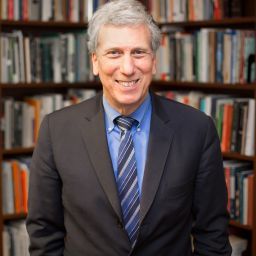Editor’s Note: Arnold M. Eisen, one of the world’s foremost authorities on American Judaism, is the chancellor of The Jewish Theological Seminary. The opinions expressed in this commentary are those of the author; view more opinion articles on CNN.
My father, a good and pious man who thanked God every morning for the gift of another day, would have said – were he alive right now – that God has a lot to answer for.
So much death and suffering! So many hopes for a better life, destroyed by pandemic. Such an incalculable amount of trust – in government, in the future, and in God – undermined or irreparably lost.

People of faith often wonder aloud at moments of personal and collective tragedy how a good God could permit “bad things to happen to good people.” They also tend to turn (or return) to religion for help in bearing the unbearable. In coming months, Americans will more strongly feel the hunger for community and meaning as we come back together (at least to some extent) and seek to find purpose in our suffering.
The nation’ s ability to heal its body and soul will heavy rely on whether or not religious institutions can find new ways to bring people together and find meaning in what we’ve experienced .
One of the cruelest aspects of the coronavirus pandemic is that it forces so many people to die or grieve the dead alone. The Hasidic Jews who congregated, without social distancing, on Brooklyn’s streets for a public funeral recently gave vivid expression to the frustration and anger that many Americans feel at not being able to accompany their family and community members to the grave.
Funerals and shivah visits conducted through a computer cannot offer the comfort of tearful hugs, outstretched hands and physical presence. Nor can we celebrate high points of our lives together in this “virtual” way.
Religion thrives in normal times, and helps its adherents thrive, through in-person rituals: these are regular experiences of communal solidarity, taking form as baptisms and weddings, breaking a Ramadan or Yom Kippur fast, or raising voices together in prayer.
But religious leaders, just the same, have quickly learned how to provide sacred meaning through words and music at a distance, on a screen. They will have to use technology even more imaginatively to hold and serve their members as we emerge from total isolation in coming months and the need for answers to the “why” questions grows more insistent.
Some traditional teachings have already begun to take on new meaning. “Love your neighbor as yourself” resonates as never before when one is wary of neighbors who do not wear masks, and dependent upon neighbors previously taken for granted: those who deliver mail and groceries to our doors, drive ambulances, collect the garbage, minister to the stricken in hospitals, staff unemployment offices, or work in labs around the world to develop the vaccines and therapies that alone can save us from the virus.
The religious teaching that “all human beings are created in God’s image,” meaning we constitute one humanity and are entitled to be treated with dignity, has come to seem an obvious, simple truth. We have all learned in our enforced time alone that we are not alone in our predicament, our countries, or our faiths. The concept of “global community” is real as never before.
Overcoming the Covid-19 pandemic and future crises will require a degree of cooperation, inclusivity and mutual trust beyond anything that nations – or their religions – have exhibited in the past. Religions, having preached love and unity, will need to be its agents and advocates.
I am confident that many religious institutions can and will change to meet the challenge. In some ways they already have. Despite the distance created by digital funerals and shivahs, they now include friends and family from far away. Congregants forced to be at home tune into religious programming they might not have had time for before.
One of the most meaningful initiatives in which I have participated in recent weeks brought together leaders of eight American faith communities in early April to offer prayers and blessings for healing in campaign called United Faiths of America 2020.
Such initiatives will likely continue and expand post-pandemic. Congregations that have learned to reach out beyond shuttered physical spaces to members and non-members, whether near at hand or a continent away, will likely not stop serving these enlarged communities once the recovery begins.
Religious denominations understand that they, too, will have to cross boundaries as never before if they are to remain credible and relevant in this new era.
America remains among the most religiously observant and faithful countries on Earth, and spiritual recovery will therefore play an important part of our national healing.
Get our free weekly newsletter
In time, we may see evidence of theological revival. Rabbi Abraham Joshua Heschel liked to point out that experiences of justice and compassion often unlock the door to faith far more effectively than doctrinal argument.
Confidence in God’s healing power grows when one witnesses doctors, nurses and first responders selflessly risking their lives to heal others. By the same token, evidence of injustice – such as the unequal access to health care and so to life itself – mocks and undermines the claim that God’s loving shelter encompasses everyone.
God is not alone in having a lot to answer for these days. The burden falls on all of us, and especially on members of religious communities (in the words of Jewish morning prayers) “to give strength to the weary and raise up those who are bowed down.”

















